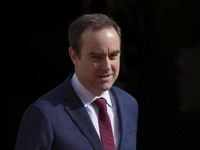France found itself at the epicenter of a political and social storm this week, as hundreds of thousands took to the streets on September 18, 2025, protesting President Emmanuel Macron’s austerity policies. The demonstrations, called by France’s major trade unions, brought much of the country to a standstill, with public transport halted, schools shuttered, and pharmacies closed. The scale of the unrest, and the political chaos surrounding it, has left many inside and outside France questioning whether the country is facing a historic turning point—or even a new era of decline.
The leftist CGT union claimed that more than a million people participated nationwide, surpassing the 900,000 who rallied in June 2023 against Macron’s controversial decision to raise the retirement age from 62 to 64. French authorities, typically more conservative in their estimates, put the number at over 500,000, including 55,000 in Paris alone, according to figures cited by AFP and BBC. Regardless of the count, the message was clear: a broad swath of French society is fed up.
The protests were not just large, but disruptive. Only the three automated, driverless lines of the Paris Metro ran normally, while commuters elsewhere faced chaos. Around one in six teachers at primary and secondary schools joined the strike, and nine out of ten pharmacies were closed for the day. On the outskirts of Lille, protesters blocked bus depots at dawn, and even schoolchildren joined in, blocking the Maurice Ravel secondary school in eastern Paris with banners reading, “Block your school against austerity.”
Clashes with police broke out in Paris and Marseille, where officers used tear gas to disperse unauthorized gatherings. Interior Minister Bruno Retailleau reported that 309 people were detained and 26 officers injured, with approximately 7,300 so-called “radicalized” demonstrators joining the fray. In Nice, the anger was palpable—protesters threw an effigy of Macron into the air, demanding his resignation. “We’ve had enough, he’s tormenting France,” declared Sophie Larchet, a 60-year-old civil servant, to AFP, capturing the mood of many present.
But the street anger is only one part of the crisis. France’s political system is in turmoil. In less than two years, the country has cycled through five prime ministers, a pace of change that, as BBC noted, even outstrips Italy’s legendary post-war instability. The most recent appointment, Sébastien Lecornu—a 39-year-old former defense minister and close Macron ally—was supposed to bring stability when he took office on September 12, 2025. Instead, he inherited a parliament fractured by the snap election of July 2024, with no clear majority capable of passing a budget.
The roots of the current unrest trace back to Macron’s dissolution of the National Assembly in early summer 2024. Rather than strengthening his hand, the move produced a parliament split three ways: center, left, and far-right. “No single group could hope to form a functioning government because the other two would always unite against it,” explained BBC’s Hugh Schofield. This deadlock has made it nearly impossible to pass fiscal reforms, leaving the country lurching from one crisis to the next.
The economic backdrop is equally grim. France’s national debt now exceeds 3 trillion euros, or about 114% of GDP. Servicing that debt will cost an estimated 67 billion euros this year—more than any government department except education and defense. Projections suggest that by decade’s end, annual debt service could reach 100 billion euros, outstripping even those pillars. Last Friday, September 12, 2025, ratings agency Fitch downgraded French debt, making borrowing more expensive and casting further doubt on the country’s economic stability.
François Bayrou, Macron’s previous prime minister, tried to address the crisis with a plan to cut 44 billion euros from the 2026 budget, including scrapping two public holidays—measures that proved wildly unpopular. Bayrou was ousted last week after left and far-right MPs united against him, and polls showed widespread hostility to his proposals. The new prime minister, Lecornu, faces a Herculean task: he must present a budget by mid-October and somehow stitch together support from both moderate left and right parties. Macron, for his part, insists that “an agreement between the political forces is possible while respecting the convictions of each.” But as economist Philippe Aghion told BBC, “Macron and Lecornu are essentially one,” and the political risks are enormous.
The left-wing Socialist Party has seized the moment, demanding a lower target for debt reduction, a tax on ultra-rich entrepreneurs, and repeal of Macron’s pension reform. These demands are anathema to the conservative Republicans, who have threatened to vote against the budget if taxes are raised. Even the main employers’ union, MEDEF, has threatened to stage its own “mass demonstrations” if the government opts for higher taxes. With municipal elections looming in March 2026 and a presidential race set for May 2027, few politicians are eager to make concessions, especially with Macron’s popularity at an all-time low.
International observers have taken notice, sometimes with a touch of schadenfreude. Italian newspapers, according to BBC, have delighted in France’s woes, asking pointedly, “So where is the grandeur now?” The risk of France needing a bailout from the IMF or intervention by the European Central Bank is no longer dismissed as fanciful. As economist Philippe Dessertine warned, “It is like we are on a dyke. It seems solid enough. Everyone is standing on it, and they keep telling us it’s solid. But underneath the sea is eating away, until one day it all suddenly collapses.”
Yet, not everyone sees disaster on the horizon. Jean-François Copé, a former president of the conservative Republicans, pointed out that “the fundamentals of the French economy, including its balance of imports and exports, remain solid.” Unemployment remains higher than in the UK, but not disastrously so. Business creation is robust, and growth outpaces Germany’s. Even economist Aghion remains cautiously optimistic: “We are not about to go under, Greece-style. And what Bayrou said about debt was an effective wake-up call.”
Still, the sense of crisis is hard to ignore. As Françoise Fressoz of Le Monde observed, “We have all become totally addicted to public spending. It’s been the method used by every government for half a century—to put out the fires of discontent and buy social peace. Everyone can sense now that this system has run its course. We’re at the end of the old welfare state. But no one wants to pay the price or face up to the reforms which need to be made.”
France now faces a perfect storm: political gridlock, spiraling debt, social unrest, and a president running out of time and options. As commentator Nicolas Baverez wrote in Le Figaro, “Emmanuel Macron is the real target of the people’s defiance, and he bears entire responsibility for this shipwreck. Like all demagogues, he has transformed our country into a field of ruins.”
Whether France muddles through, as it so often has, or emerges fundamentally weakened, is still an open question. But after this week’s events, it’s clear that the old certainties no longer hold.




